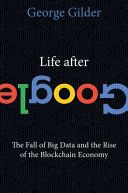

George Gilder's 'Life After Google' offers a thought-provoking critique of the current state of the internet and the dominance of tech giants like Google. Gilder argues that the centralized control exerted by such compan...
Continue readingIn 'Life After Google', George Gilder argues that the dominance of Google is not sustainable. He highlights how the company's centralized control over data and information is becoming increasingly problematic. As privacy...
Continue readingGilder delves into the transformative potential of blockchain technology as a key player in the post-Google era. He explains how blockchain enables decentralized networks that empower individuals rather than corporations...
Continue readingA central theme in 'Life After Google' is the growing importance of privacy and user control in the digital age. Gilder discusses how users are increasingly aware of the value of their personal data and are demanding gre...
Continue readingGilder explores the role of artificial intelligence (AI) in the future of technology and its relationship with the decline of Google. He argues that while AI has the potential to enhance productivity and innovation, it a...
Continue readingIn 'Life After Google', Gilder discusses how the decline of centralized tech giants like Google will pave the way for a new wave of innovation. He argues that the monopolistic practices of these companies stifle competit...
Continue readingGilder examines the economic implications of moving towards a decentralized internet and the decline of Google. He argues that decentralization will not only empower individuals but also create new economic models that c...
Continue readingIn the concluding chapters of 'Life After Google', Gilder presents his vision for a new internet that is built on the principles of decentralization, privacy, and user empowerment. He argues that the future of the intern...
Continue readingThe reading time for Life After Google depends on the reader's pace. However, this concise book summary covers the 7 key ideas from Life After Google, allowing you to quickly understand the main concepts, insights, and practical applications in around 21 min.
Life After Google is definitely worth reading. The book covers essential topics including The Decline of the Google Empire, The Rise of Blockchain Technology, The Importance of Privacy and User Control, providing practical insights and actionable advice. Whether you read the full book or our concise summary, Life After Google delivers valuable knowledge that can help you improve your understanding and apply these concepts in your personal or professional life.
Life After Google was written by George Gilder.
If you enjoyed Life After Google by George Gilder and want to explore similar topics or deepen your understanding, we highly recommend these related book summaries:
These books cover related themes, complementary concepts, and will help you build upon the knowledge gained from Life After Google. Each of these summaries provides concise insights that can further enhance your understanding and practical application of the ideas presented in Life After Google.